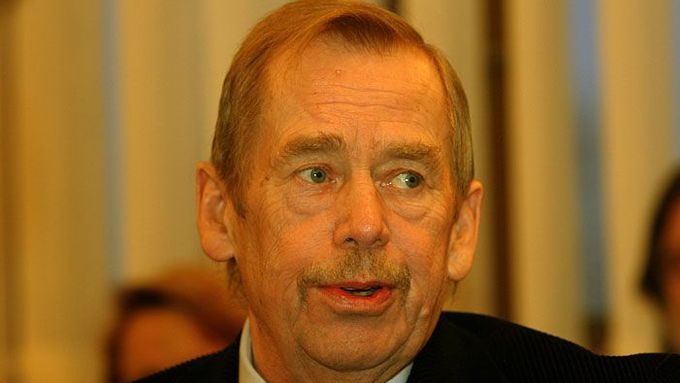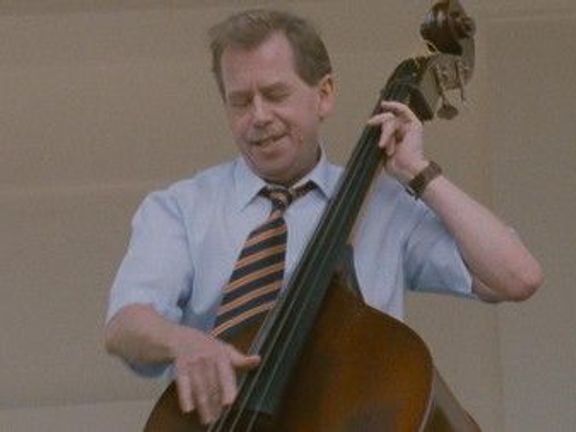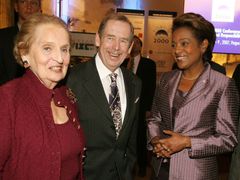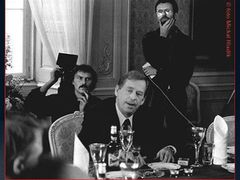Prague - Václav Havel spent two presidential terms having a film crew almost constantly behind his back. It was the late film director Pavel Koutecký and his cameramen making a feature documentary about the dissident playwright who became the head of state.
The film is now almost finished and should be pre-premiered 26 January. It was also selected to represent the Czech Republic in this year´s international film festival in Berlin.
The documentary using the long-term observance technique is set to attract as much international attention as its main protagonist did during his presidency. Or is there any other flick whose cast includes two American presidents, Rolling Stones and Havel's pooches Madla and Šugr?
Rocky road to Berlin
Making of the film has been, however, somewhat bumpy.
The film director Pavel Koutecký began shooting in the autumn of 1992 having followed Havel at official meetings as well as in private moments and backroom dealings at post-election negotiations of top politicians. He had a unique chance to film Havel with both the world leaders and his close friends.
But Koutecký died unexpectedly before he could finish the film in 2006 and it was another Czech film maker who took over.
Miroslav Janek is an emigrant-returnee and has made a number of films dealing with social themes, such as Roma community and children living in social care homes.
Switch it off, please!
Not everyone felt comfortable under the omnipresent eye of Koutecký´s camera. "When they told me about this project, I was appalled," admits Ladislav Špaček, the ex-President's long-time spokesman.
"Václav Havel is a theater person, open to everything, which means he was well-disposed towards this, but we around him were afraid that this material could fall in wrong hands and get him in trouble," Špaček explains, adding that he acquiesced in the filming only when he got to know Koutecký better.
The film captures private meetings with a lot of other politicians who had a problem with Koutecký's camera. "Can you imagine [the current Czech President] Václav Klaus to allow being monitored like that?" Špaček asks.
Of all the top politicians, only ex-Prime Minister Miloš Zeman okayed the filming, and Havel's aides admit that they, too, often had the camera stopped. "I had the camera stopped whenever the President was reciting or singing," says Anna Freimanová, Havel's secretary. Nevertheless, the film does capture a few such moments.
"I stopped the camera in the official White House residence, when the debate shifted to a topic reserved for people with a 'top secret' security clearance," adds Ivo Mathé, former Havel's chancellor.
According to Špaček, many Havel's aides couldn't come to terms with the filming until the very end, and fell silent whenever the cameras were present. "And I, too, belonged among the more frightened members of his inner circle," Mathé adds.
In any case, Havel's aides concur that the first Czech President was very open during the filming; it was them who had to watch what could still be recorded, and what couldn't.
They even had a signal for that: blinking the flashlight into Koutecký's camera. "After that I knew we could talk a bit more freely," Špaček remembers.
My own private Havel
Even so, the film is a very open insight into Havel's privacy and political backstage. "What I saw is an entirely authentic statement about Václav Havel," says Špaček, who recently took on a role of an etiquette expert, frequently lecturing on the topic in the media.
"It will probably be a rather emotional experience for viewers to see Havel as a charismatic person, someone who sparkles with wit, who is very open, and who carefully rehearses all his public appearances, much like in theatre."
"For me, it is also a recollection of [Havel's deceased first wife] Olga, whom we really loved," Freimanová adds.
The film culminates during the Prague NATO summit in 2002 and during Havel's retirement from office, with the tones of "Ode to Joy" being heard in the background.
Havel goes to Nova
The film will also be broadcast, maybe somewhat unusually for a Czech documentary, by TV Nova private channel, which is the film's official partner. "[The public service] Czech Television missed the window of opportunity to join the project," explains Pavel Strnad from the Negativ company that produced the film.
"We see it as a commercial film. It is very amusing, it reveals Václav Havel's personality," says Petr Dvořák, Nova CEO. "I believe it's going to be one of our blockbusters."
Citizen Havel will enter the Czech cinemas on January 31st, before going to Berlinale. With its release just days before the forthcoming presidential elections, it is guaranteed to make many Czechs nostalgic for the times when the world leaders considered it a privilege to shake hands with this country's head of state.
Originally scheduled to attend the pre-premiere of the film later this week, Václav Havel was hospitalized last weekend with heart arythmia, casting his expected presence at the event into much uncertainty.










